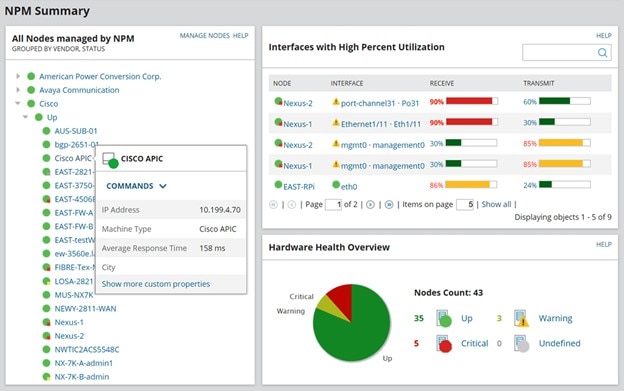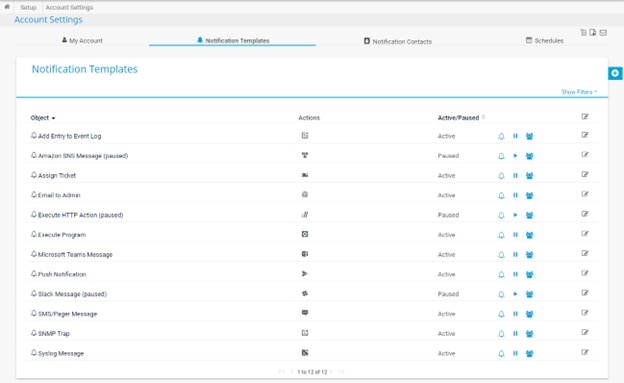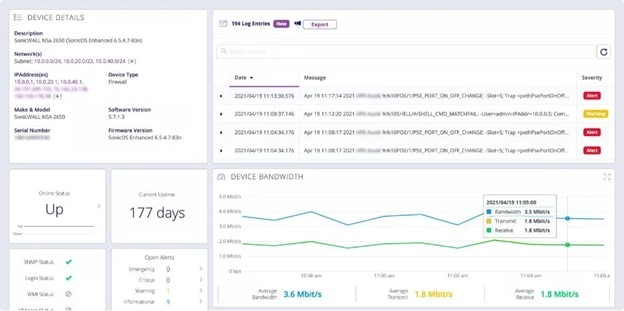Network device scanning effectively ensures connected devices and applications to your network perform as per the expected standards without any vulnerabilities. Regular network scanning allows you to gather data from the connected devices and applications to check their uptime and performance. It can also allow you to safeguard your network devices and applications from cyberattacks.
You can utilize active and passive scanning techniques to obtain a holistic view of your network performance. Active scanning involves sending a ping to every device in your network via automated scanning tools for uptime monitoring. On the other hand, passive scanning emphasizes monitoring the packet-level network traffic to detect malicious patterns and anomalies. However, passive scanning can’t monitor the non-communicating devices. It is also possible to manually track network devices’ connectivity and uptime status using Address Resolution Protocol (ARP) scans. However, manual scanning of devices in large networks is challenging, so using automated scanning tools can be preferable for network admins.
- SolarWinds Network Performance Monitor (Free Trial)
- SolarWinds IP Address Manager (Free Trial)
- ManageEngine OpUtils
- Paessler PRTG Network Monitor
- Auvik
Network Scanning Tools Benefits
How do network device scanners work?
5 Best Network Scanners in 2024
Outlined below is a list of popular network device scanning tools to consider for your organization:
1. SolarWinds Network Performance Monitor (Free Trial)
Automated network scanning tools can offer several advantages, such as:

SolarWinds® Network Performance Monitor (NPM) is a comprehensive solution built for network device discovery and management. It is designed to utilize multiple protocols, such as SNMP and ICMP, to locate and monitor the devices and applications in a multi-vendor network.
Key Features:
- auto device discovery module can give you the flexibility to find network devices by IP addresses, subnets, or IP range and create instant network topologies based on the discovered devices.
- tracking and analyzing the performance of your network devices and applications through intelligent dashboard visualizations and custom reports.
- maximize network uptime by sending timely notifications regarding the poorly performing devices in your network.
2. SolarWinds IP Address Manager (Free Trial)

SolarWinds® IP Address Manager (IPAM) can be a viable solution for users looking to discover and manage their network devices using IP addresses. This tool relies on ICMP protocol for network device discovery and management.
Key features:
- create and manage subnets and monitor DNS records and DHCP servers from a centralized console.
- support quicker troubleshooting of IP-related network issues, including DNS conflicts and MAC address changes.
3. ManageEngine OpUtils

ManageEngine OpUtils is designed to be a reliable network scanner to help you perform ICMP ping sweeps and SNMP scans to track and manage various devices in your network.
Key features:
- allow you to schedule regular network scans to identify rogue devices and configure threshold-based alerts for a quick response to critical network issues.
- provide granular insights into the uptime and performance of your network devices through real-time dashboards and data-rich reports.
4. Paessler PRTG Network Monitor

Paessler PRTG Network Monitor is built to be a robust solution that can offer real-time IT infrastructure monitoring capabilities. This intuitive tool can perform quick network scans to provide visibility into your network resources’ performance and uptime metrics.
- intelligent graphical charts and custom reports,
- determine the application and device-specific bandwidth utilization, uptime, and traffic flow
- network maps and custom alerts to stay updated on critical network problems.
5. Auvik

Auvik is designed to be a ready-to-deploy network scanner capable of analyzing the network traffic in real-time to identify anomalies. This cloud-ready solution can also assist you in automatic device discovery and intelligent network mapping to determine the device interdependencies and connection status.
- analyzing the root cause of network performance problems by centrally analyzing the log data captured through connected devices and applications on a unified dashboard,
- allow you to run uninterrupted operations by sending timely alerts regarding suspicious network activities.
How do network device scanners work?
Network device scanners use protocols such as Internet Control Message Protocol (ICMP), Simple Network Management Protocol (SNMP), and WMI to observe and manage your network devices. Many modern network scanning tools can perform both active and passive scanning while monitoring the connected devices and applications. In the case of active scanning, these tools ping every device in a network to check its uptime status, whereas, during passive scanning, they focus on monitoring the packet flow in a network to identify anomalies. Network scanners can smartly analyze the data captured through the network endpoints to give you critical network information, such as device availability, performance, and bandwidth utilization. Similarly, analyzing the packet-level traffic can allow these tools to identify issues in different parts of your network.
Advanced network scanners can also give you the flexibility to discover the network devices by IP addresses, subnets, and Active Directory. These tools can perform port and vulnerability scanning. Port scanners can easily detect the device type and different services running on a network device by scanning its open and closed ports.
Network Scanning Tools Benefits
- Improved network visibility: Automated network scanning tools can help rapidly locate all the devices and applications connected to your network and create instant network topologies for improved visibility. Having such visibility allows you to quickly detect poor device configuration, bandwidth overconsumption, and other network performance issues and fix them to ensure business continuity.
- Robust network security: Network scanning tools can be used to observe your network and help you identify weak nodes and connections vulnerable to attacks. The insights these tools offer regarding outdated devices, misconfigurations, and other network vulnerabilities can allow you to create an appropriate threat response and prevention plan for improved security.
- Higher staff productivity: Manual scanning network devices for issues can be tedious and perplexing, especially in large organizations with continuously scaling networks. Automated scanning tools can help maximize your IT staff productivity by allowing them to automatically discover, manage, and troubleshoot IT resources based on intelligent data insights.
Network Device Scanners Summary
In a nutshell, network scanning tools can help simplify the task of monitoring your network devices’ performance and uptime status. However, considering various network scanning solutions are available in the market with a diverse toolset, it is important to spend considerable time identifying the right option for your business. Based on our extensive research on network scanning solutions, we would like to recommend SolarWinds Network Performance Monitor and IP Address Manager for your network device discovery and management needs. We believe both of these products offer an intuitive user interface, intelligent network visualizations, timely alerts, and a host of other enterprise-ready tools to help you proactively monitor and manage your network devices. Additionally, we think SolarWinds Network Performance Monitor and IP Address Manager can provide the much-needed flexibility and scalability to monitor different types of enterprise networks with varying complexity.